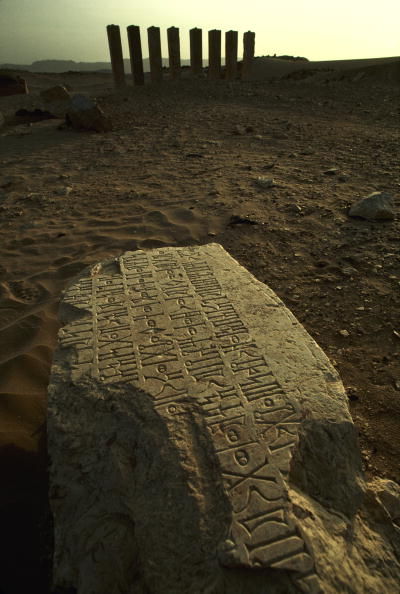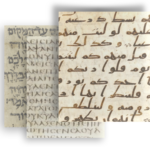
In all the major religions two religions live together peaceably: the Religion of Faith and the Religion of History. With the exception, that is, of Islam, since the Islam of Faith and the Islam of History are engaged in continuous warfare. The Religion of Faith is the intimate relation between the believer and his Lord, through the practice of his beliefs and the unquestioned sanctification of his books, and his religious places and personalities. But the religion of History is all of it subject to question; in that it embraces the relation between the researcher – the believer included – and religion as a subject of study. It forms part of the religious scientific disciplines such as the history of comparative religions, religious sociology, or religious anthropology, psychology, linguistics and archaeology and so on. All of which, as usual, pose more questions than answers.
IN PRIMITIVE SOCIETIES where everything constituted religion, and everything on earth was sacralised, no separation was possible between the Religion of Faith and the Religion of History. In this generalised sacralisation the human intellect is incapable of studying the Divine Intellect. Only when humanity moved step by step from nature to culture could sacralised things begin to be dismissed from the scene, in favour more and more of worldly reflection and the study of natural and social phenomena.
The monotheistic religions, including Islam, participated in removing sanctity from nature, which at that time became an experimental ground for the human intellect for the production of science and technology. This is why Heidegger, the enemy of science and technology, hated monotheistic religions and preferred the pagan myths which granted sanctity to nature and in so doing impeded its transformation into a field of science and technology. But the monotheistic religions which developed out of the sacred preserved its granting of sanctity to some of the institutions and products of the human brain which were coloured by it – to the Sharī‘a, the religious law stripped of its immanent legitimacy: the law, that is, of the human intellect, the law of the Human Will which created it.
Modernity, six centuries ago, established the separation between the divine and the human intellect, ascribing to religion its own space – the spiritual arena – whose role is the individual conscience, and leaving to the human intellect the management of the general space – the temporal arena – with its positive, rational laws and the study of natural phenomena and society (including the religious phenomenon) in fields of study specialising in them.
Therefore Islamism’s claim of the right to adjudicate on worldly affairs, by means of the judgement of faqihs, appears to be a retreat back into an arena which historical development has long moved on from. For whatever in nature and society used to be explained by religion is now explained by specialist sciences. The orthodox faiths do not dispute this. By ‘orthodox faith’ we mean that which has allotted worldly affairs to those qualified to handle them, moving from “the Sharī‘a of the patent, to the Sharī‘a of the concealed”, as the Muslim Sufis express it. That is, the move from the prevailing religiosity of sadistic delusions – which lurks like a thief in watch and through the keyhole adjudicates even on the intimate elements of Man’s life, making a ledger of their souls and imposing an ethical system upon them – to a peaceable, individual religiosity where the believer is responsible for himself alone, and respects the religious and worldly choices that others may choose to make. This is what the Islamic government of Recep Tayyip Erdoğan has achieved in a Muslim country: abrogating sadistic Sharī‘a punishments – the death penalty for adultery, homosexuality, and apostasy – and recognising the constitutional right of the Turkish Muslim to change his faith, or rather to exercise his free examination of it. [1]
This is a strong indication of the entry of modernism into the very Islamic project that opposes it
This is an urgent task that still waits to be achieved in the other Muslim lands, where political cowardice generally rules. Parallel with this historical achievement, Turkey is also engaged in securing a second achievement no less historical – the interpretation of the Qur’ān in the light of critical historical readings, where the interpretation methods applied to the Jewish and Christian texts are also applied here, so as to re-interpret the Qur’ānic text thereby and abrogate the rulings that historical development has substituted for the original rulings. This is a strong indication of the entry of modernism into the very Islamic project that opposes it.
The leadership of the Islamic movements – with the exception of the Tunisians – have yet to denounce this unprecedented ‘heresy’ in the lands of Islam. These two promising achievements are laying the foundations for an official recognition of the legitimacy of the Islam of History, so that Islam may at last stand with its head held high alongside Judaism, Christianity, Hinduism and Buddhism, and no longer be ashamed by the condemnation of its research scholars such as D. Nasr Hamid Abu Zayd, or their assassination – such as happened to Farag Foda, or their execution, as happened to Muhammad Mahmud Taha, their imprisonment (Mohsen Kadivar) or condemnation to the death penalty (Ali Aghajari), or exiling (Abd al-Karim Soroush).
How can the Islam of History attain this goal?
1) By separating the Qur’ān from science. The symbolic nature of religion cannot explain phenomena scientifically, so it should content itself with simply expressing its view symbolically and by metaphor, as the Sufis do. Science is the only specialism that can understand phenomena and explain them, what with its errors that can be periodically corrected and its facts that are periodically rendered more comprehensive. Religion explains both religion and nature religiously. But science explains religion with comparative religion and nature by means of its own scientific disciplines.

Suggested Reading
2) By correcting the Islam of Faith’s tendency to derive its rulings and law from historical contexts that created them and making them ‘supra-historical’, that is, valid for all times and places. The Islam of History derives these rulings from their historical circumstances. At that point they become, like everything in history, subject to the law of development and are therefore temporary by nature. In this way the Sharī‘a cannot be not valid for all times and places.
And in fact we are living through the evidence of this today, for religious states like Iran, Sudan and Saudi Arabia are forced to abrogate much of the Sharī‘a’s rulings whenever the state complies with positive trade and maritime laws or cooperates with international ‘usurious’ banks or invests in the ‘gambling’ of the stock exchange, or establishes diplomatic relations with “The Abode of Disbelief”, and even with the “Abode of Idols” such as India, China, North and South Korea and Japan. It has even at times forged warm links with some of these states. But the Islamic government in Turkey has also abrogated the Sharī‘a rulings which were left untouched by Atatürk’s secularism, and these are all now forbidden and held to be legally criminal infringements. Does this not indicate the lack of validity of the Sharī‘a for all times and places? Imām Mālik (711-795 AD) put it like this: “Judgement must always be in accordance with the times.” And so we might add: “law systems must always be in accordance with the times.”
[1] The author’s article pre-dates the events of July 2016 and the large-scale de-secularisation measures carried out by President Erdoğan’s government following a failed military coup, and which add a question-mark to Turkey’s continuing role model for a modernising Islam (Ed).


